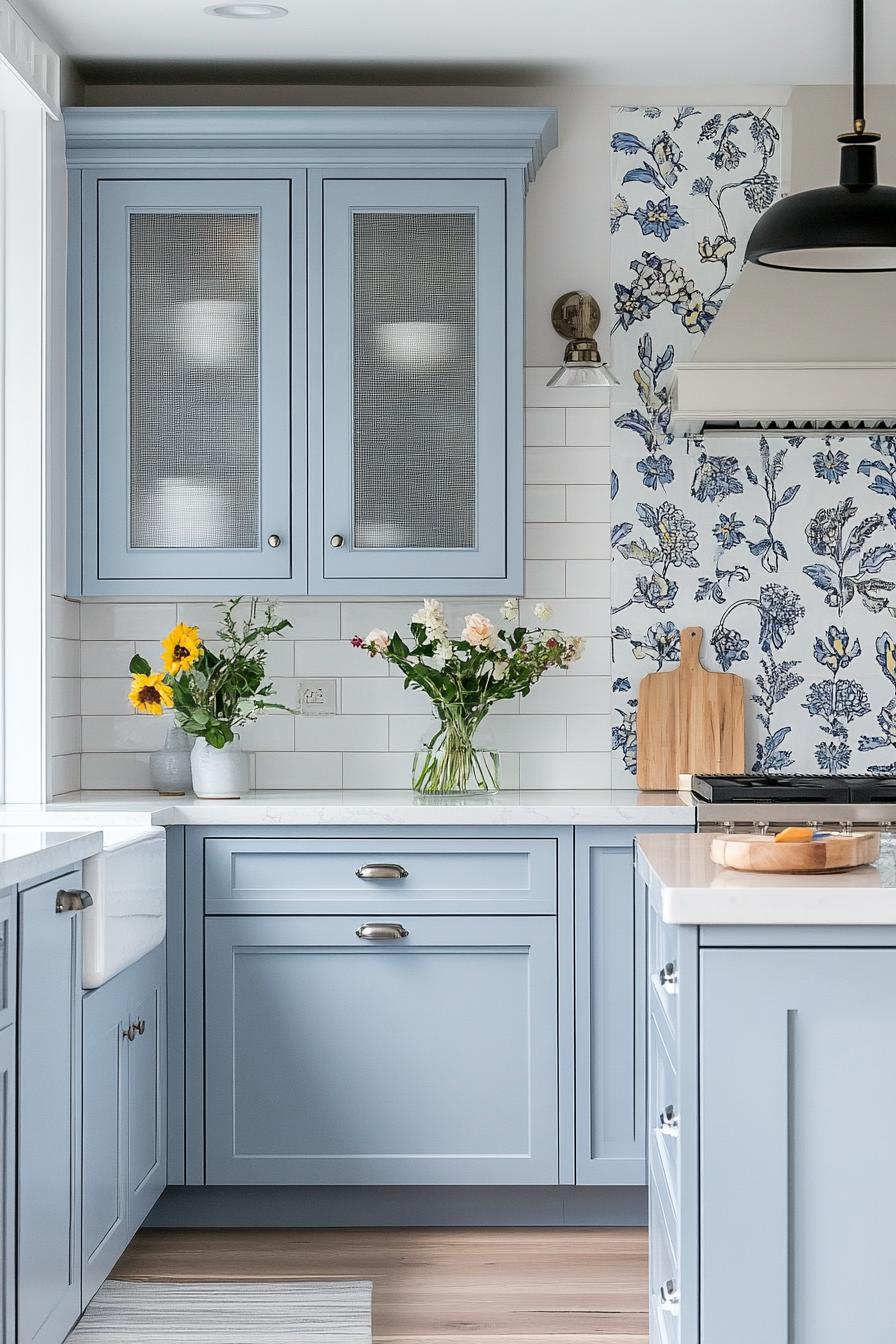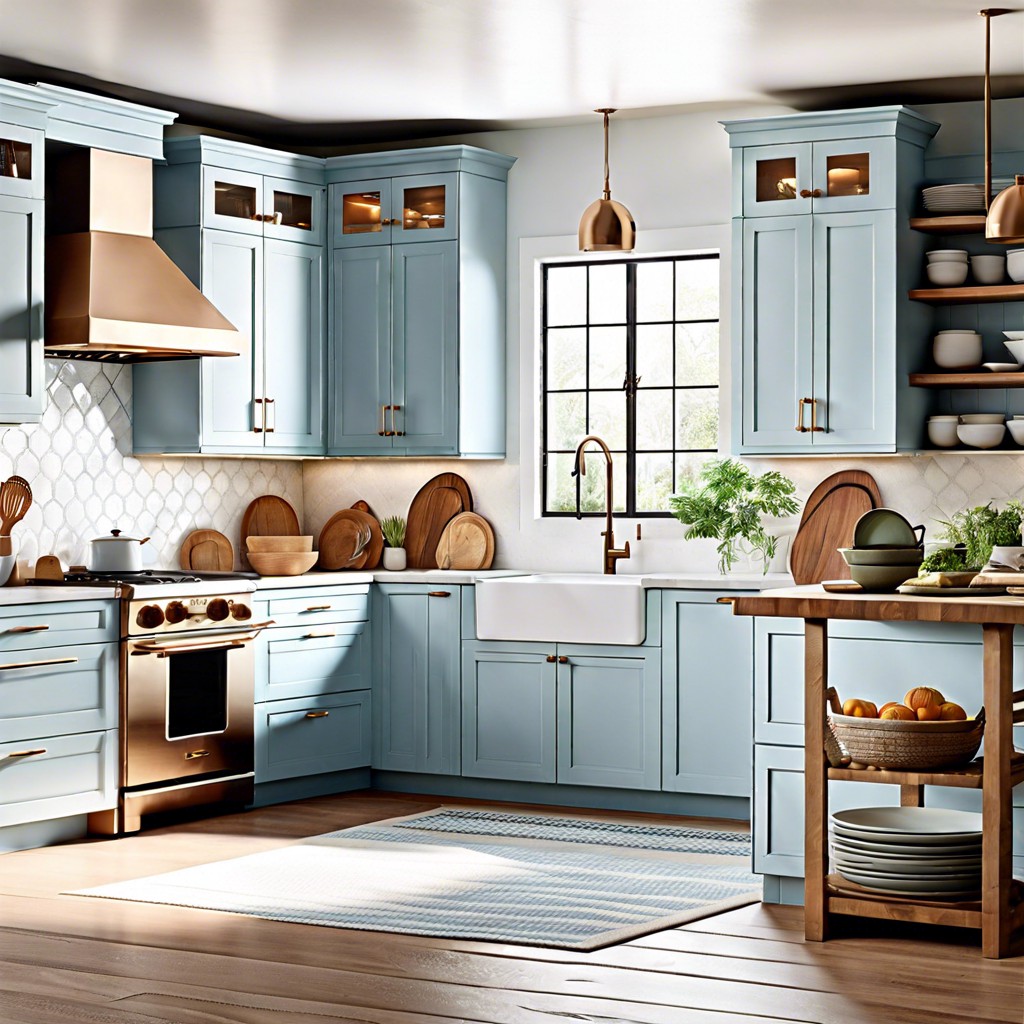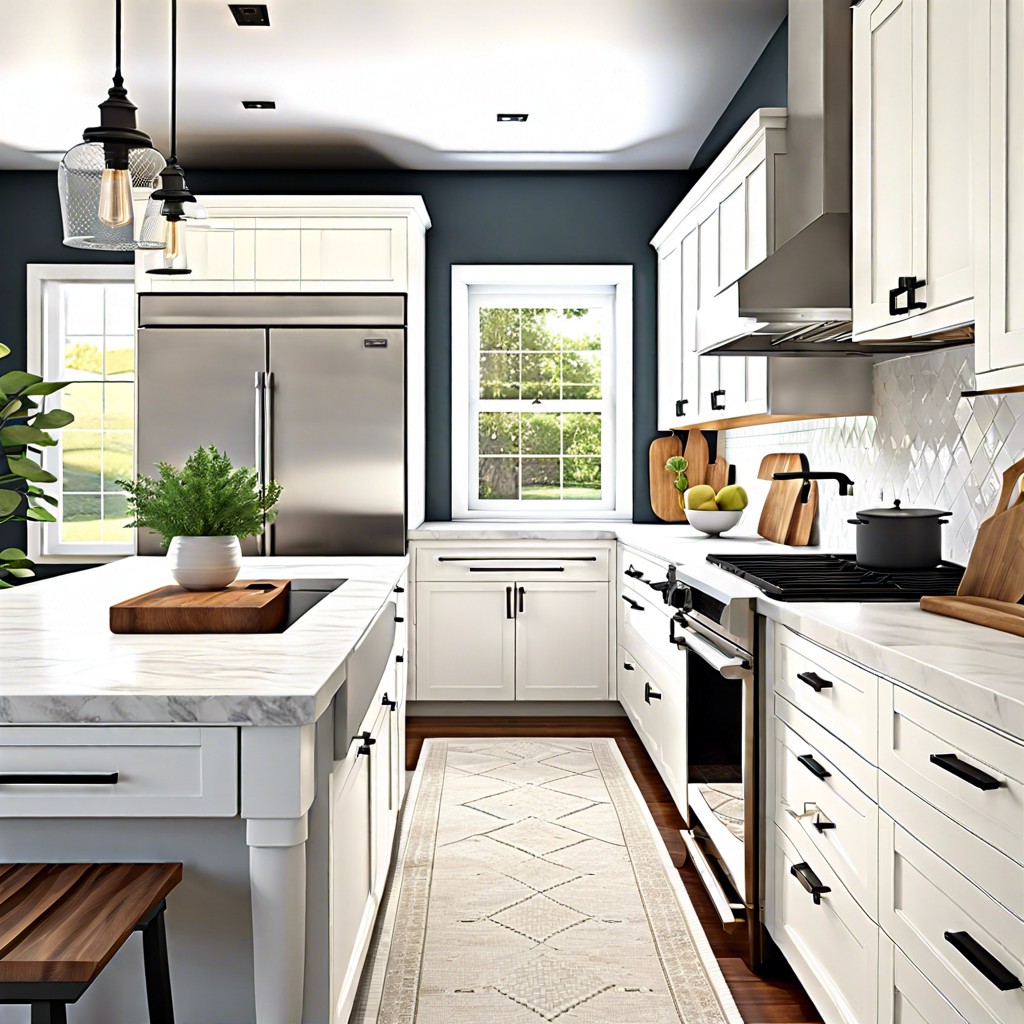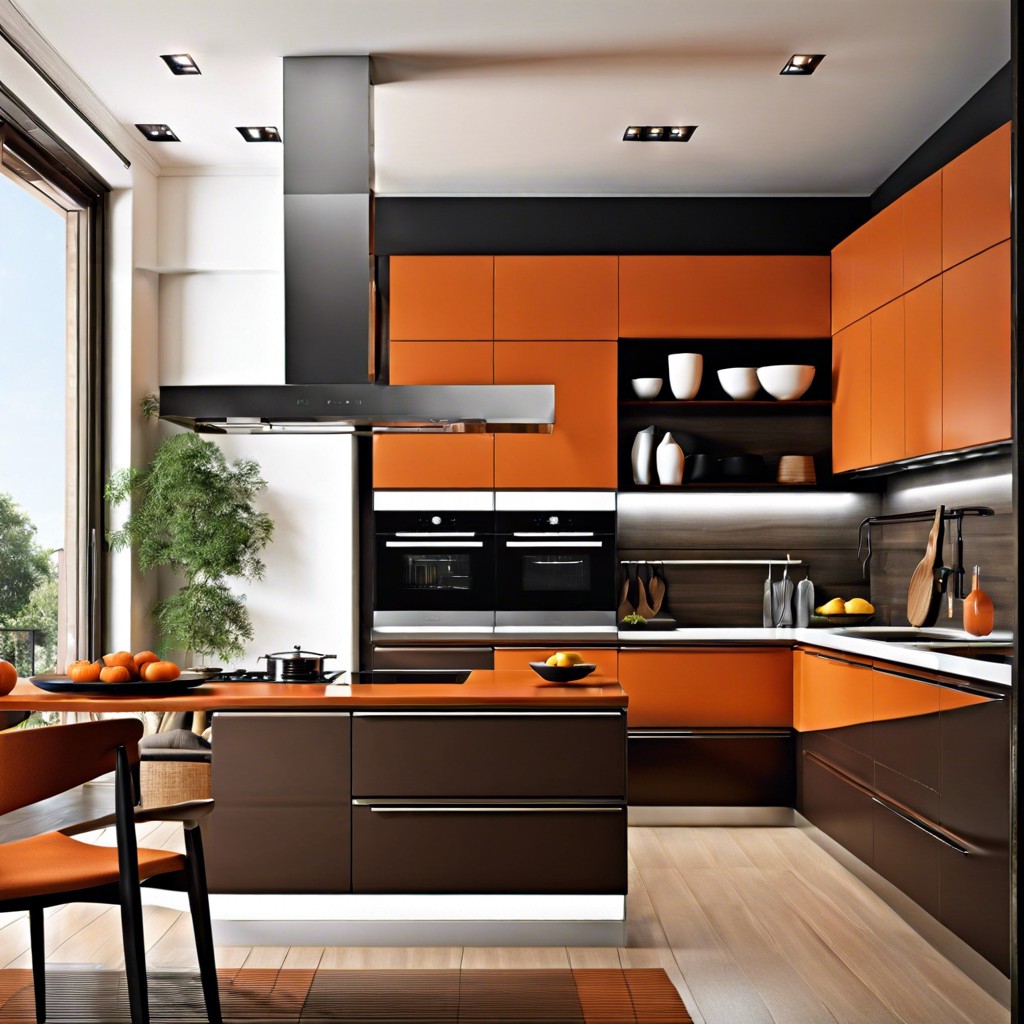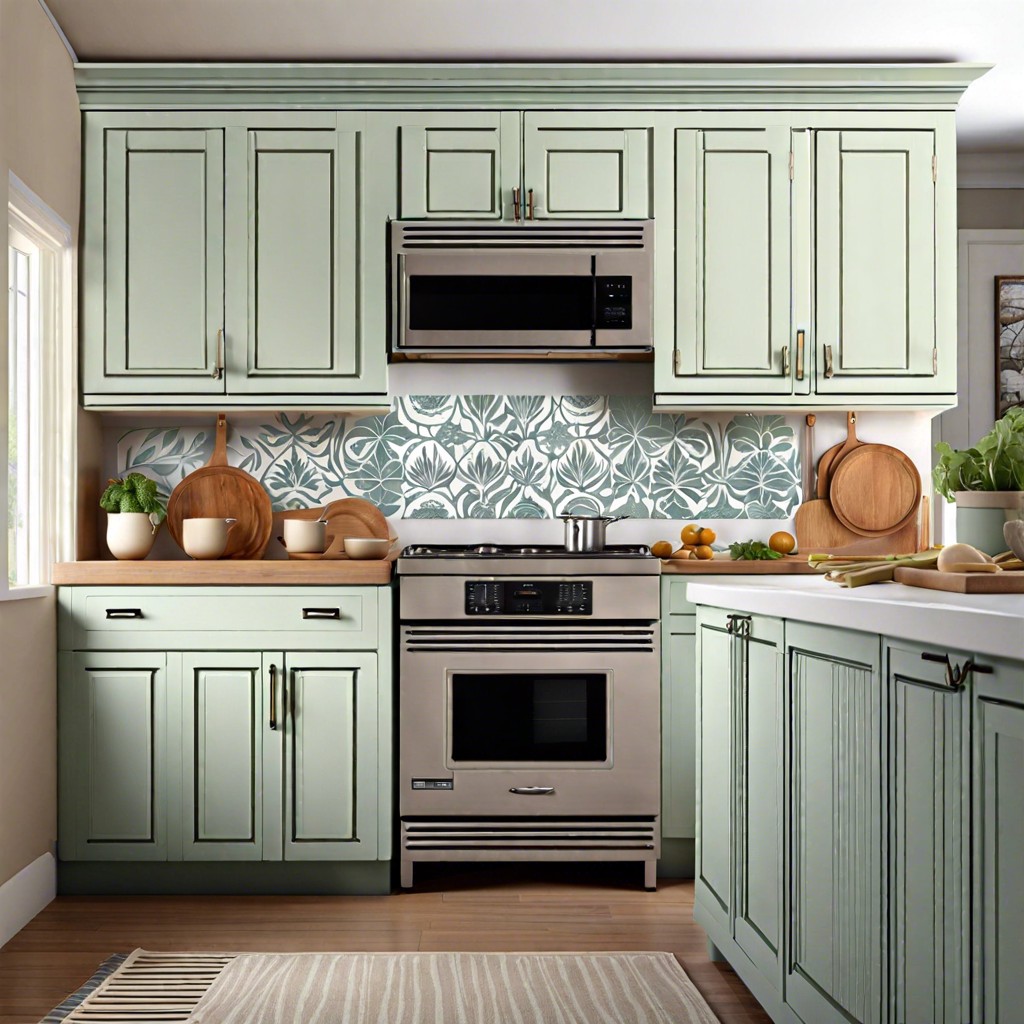Last updated on
Explore the elegance of quartz kitchen countertops because their resilience and flexibility in design unleash countless possibilities for your kitchen revamp.
Quartz kitchen countertops offer the ideal blend of form and function, marrying aesthetic appeal with durability and ease of maintenance. As a highly popular choice among homeowners, these countertops can dramatically transform your cooking space without blowing your budget.
In this piece, we delve into everything you need to know about quartz kitchen countertops – from pros and cons, to installation and maintenance tips. Find the best budget-friendly strategies to accommodate quartz countertops into your kitchen, while ensuring they remain in pristine condition for many years.
The perfect kitchen upgrade that offers beauty, longevity and a pleasing return on investment is right at your fingertips.
Key takeaways:
- Quartz countertops offer style and durability for kitchen revamps.
- Quartz is composed of natural quartz, resins, and pigments.
- Pros: durable, non-porous, resistant to stains and bacteria.
- Cons: susceptible to heat damage, more expensive than laminate.
- Quartz countertops come in a wide range of colors and patterns.
Quartz Countertop Materials
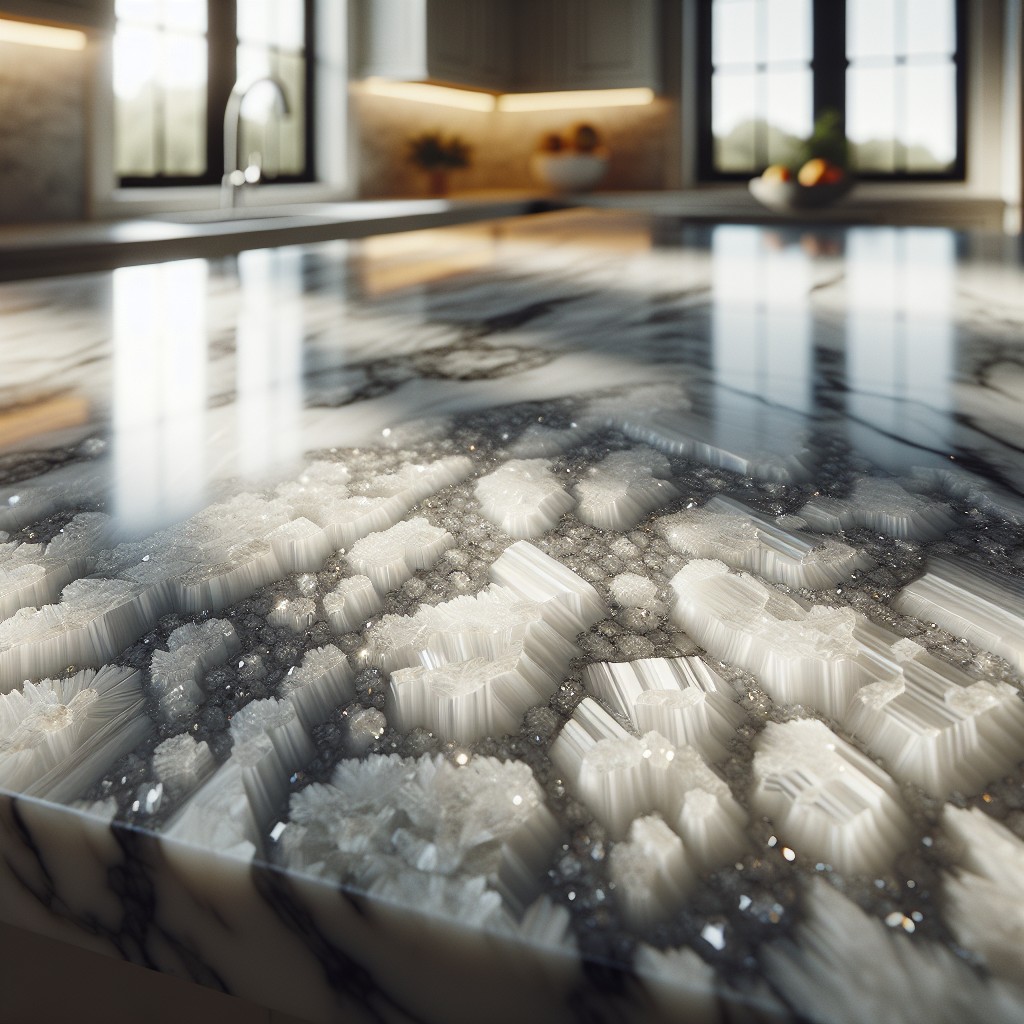
Quartz countertops, engineered from one of the hardest minerals on earth, are composed primarily of natural quartz, mixed with polymer resins and pigments. The result is a stone-like surface that’s both durable and aesthetically pleasing.
Manufacturers can also add recycled glass or metallic flecks to the mix, allowing for a wide range of colors and patterns, from monochromatic to intricately veined.
The non-porous nature of the material results in an antimicrobial surface, resistant to both stains and odors, making it an ideal choice for kitchen environments.
Additionally, unlike natural stone, there’s no need to seal quartz, reducing maintenance and increasing longevity.
Pros and Cons of Quartz Countertops
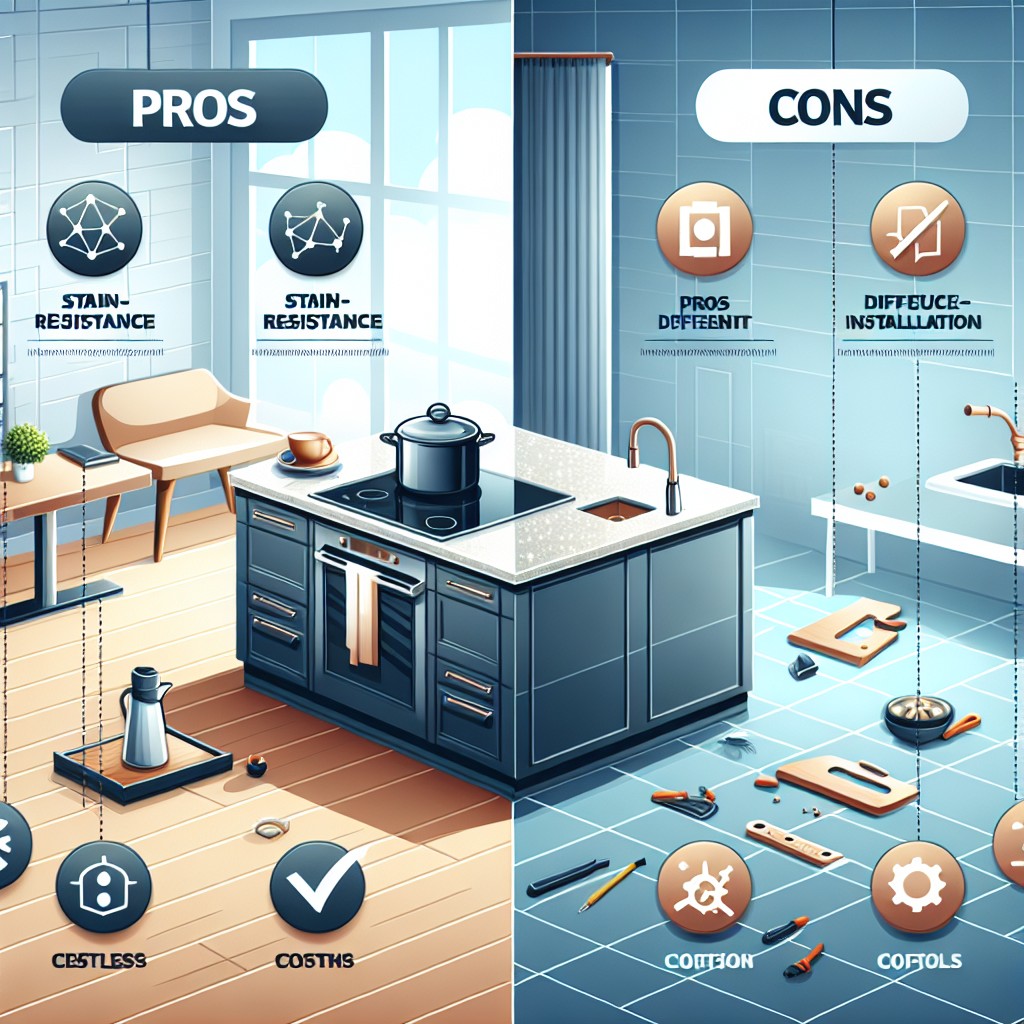
Quartz countertops offer durability and a wide variety of designs, mirroring natural stone with consistent colors and patterns. They are non-porous, which makes them highly resistant to stains and bacteria, ideal for busy kitchens where spills are a daily occurrence.
However, quartz can be susceptible to damage from excessive heat, so using trivets or hot pads is wise to maintain their condition. Additionally, while they are generally less pricey than premium natural stones like marble, quartz countertops can still be a significant investment compared to laminate or tile options.
Quartz’s weight may require additional cabinet reinforcement, affecting installation costs and time. Overall, their balance of beauty, resilience, and hygiene makes them a popular choice for both new builds and renovations, albeit with a few considerations to keep in mind.
Quartz Countertops Vs. Other Countertop Materials
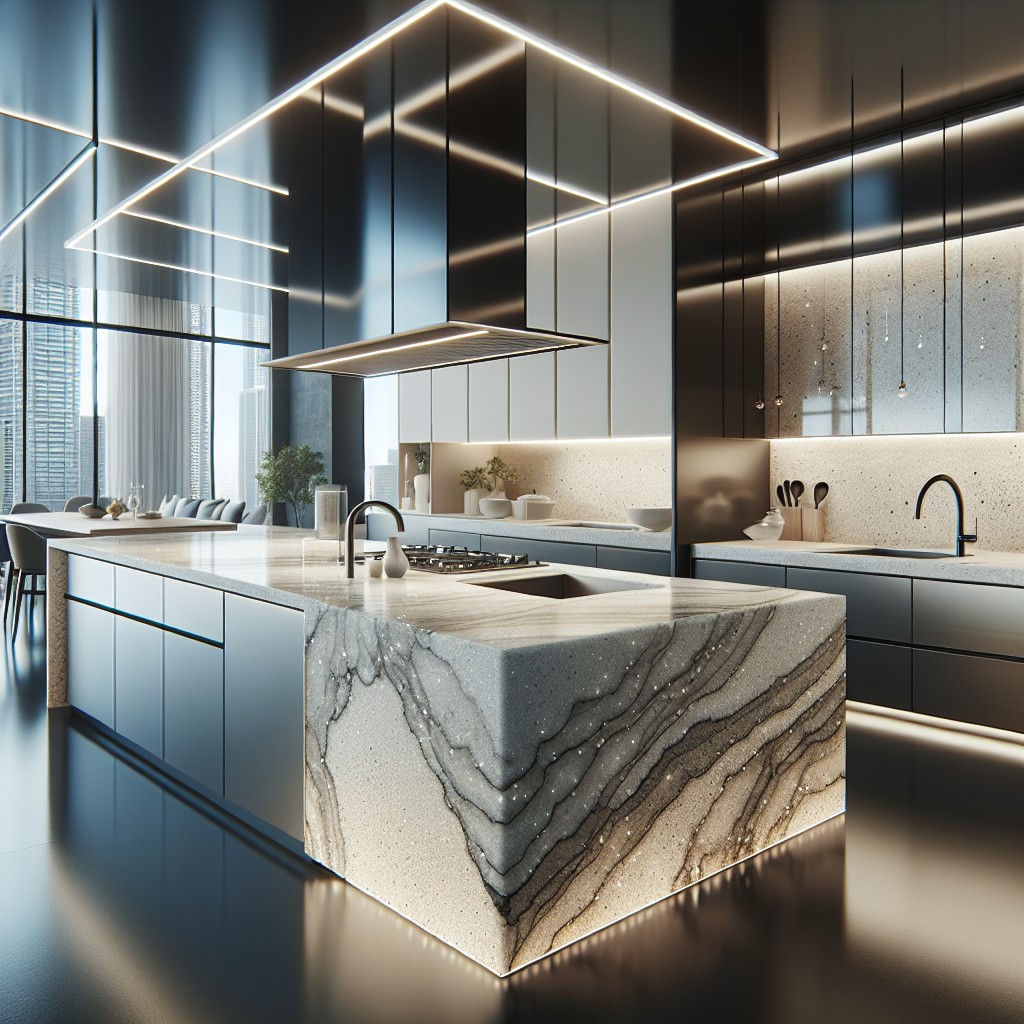
When selecting kitchen countertop materials, quartz stands out for its durability and aesthetic appeal compared to options like granite, marble, laminate, or concrete.
Unlike granite or marble, which are porous and require regular sealing, quartz is non-porous, resisting stains and bacterial growth without ongoing maintenance.
Concrete countertops offer an industrial look but can be prone to cracks and need sealing, unlike quartz, which is consistent in appearance and sturdiness.
Laminate countertops are budget-friendly and come in many designs but aren’t as heat-resistant or long-lasting as quartz.
In terms of heat resistance, both quartz and granite can withstand hot pots and pans, but quartz may discolor with excessive heat.
While marble has a unique veining that many find attractive, it’s more susceptible to etching and staining compared to quartz.
Ultimately, quartz provides a harmonious balance of aesthetics, functionality, and ease of care that can suit a variety of tastes and kitchen demands, making it a compelling choice for those looking to combine style with practicality.
Quartz Countertop Appearance
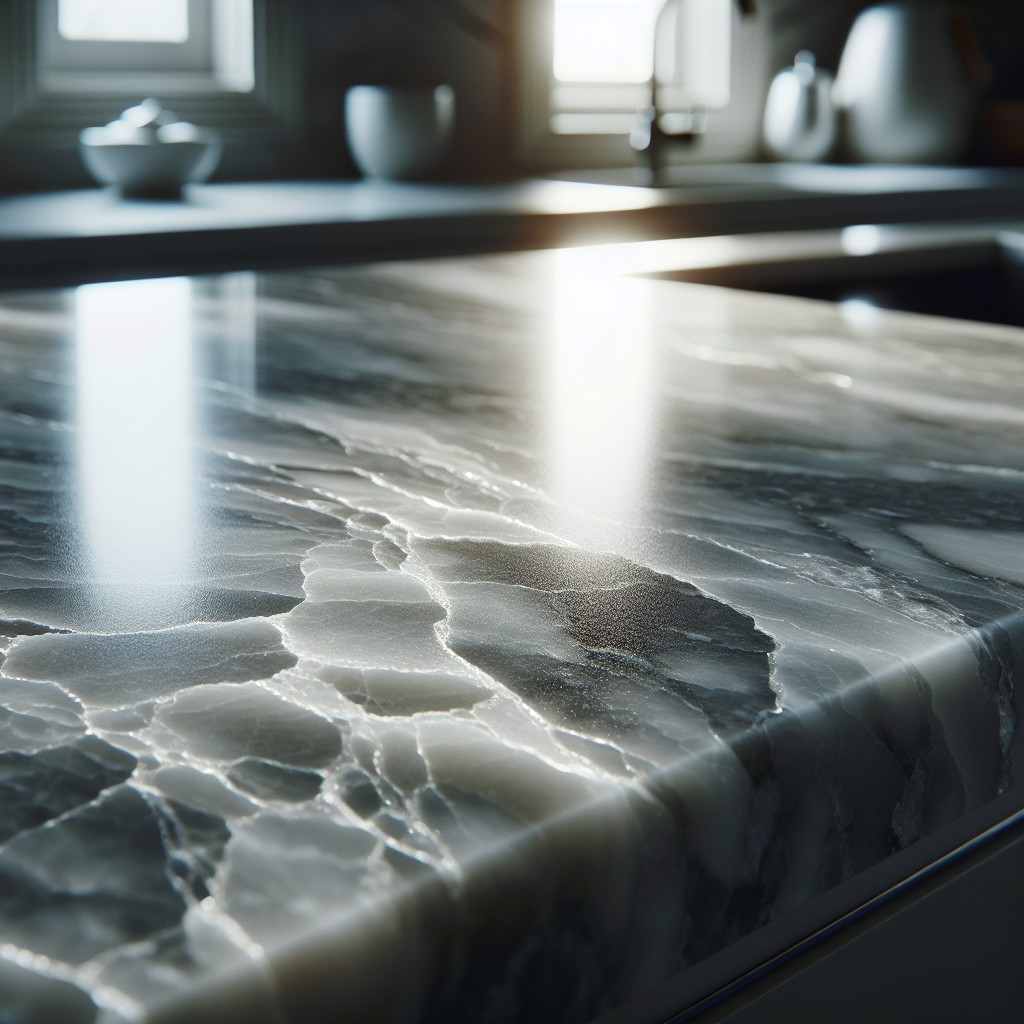
One of the most compelling attributes of quartz countertops is their versatility in design. Mimicking the sophisticated look of natural stone, quartz offers a vast spectrum of colors, from earthy browns and creams to striking grays and blacks. Additionally, it can be found in an array of patterns, including solids for a modern, monochromatic vibe or veining that replicates the elegance of marble.
Manufacturers use high-resolution printing technology to create realistic stone patterns or even more avant-garde designs not found in nature. This flexibility allows for seamless integration into any kitchen style, whether it be traditional, contemporary, or farmhouse chic. Due to its engineered nature, quartz maintains uniformity in appearance, ensuring that the sample color and pattern you fall in love with is precisely what you’ll receive with no unwelcome surprises.
Another advantage is the finish options quartz provides; you can opt for a polished finish for a radiant gloss or a honed finish for a more subdued, matte look. Non-porous and sleek, these countertops don’t just look impeccable—they also offer a smooth surface that is easy to clean and maintain, aligning aesthetics with practicality.
Cost of Quartz Countertops
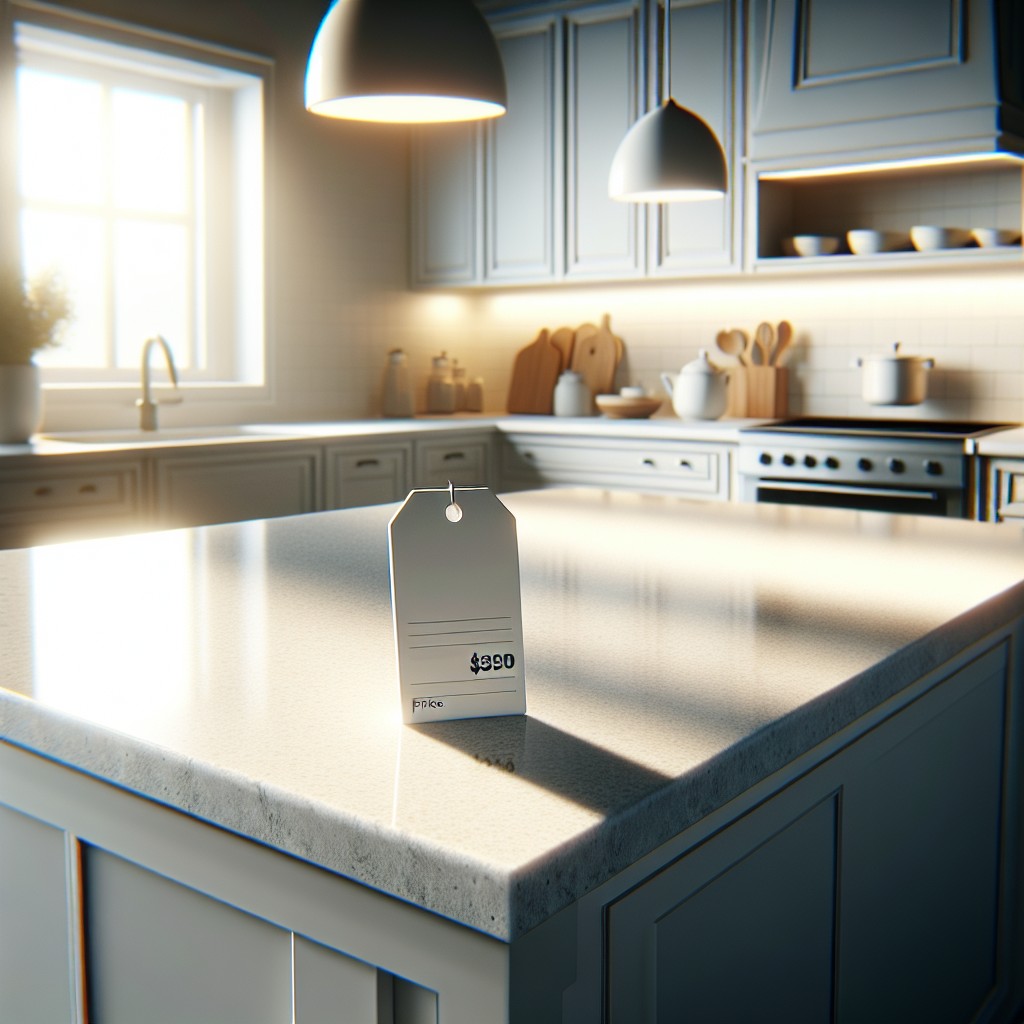
When planning your kitchen renovation, it’s vital to consider your budget for materials. Quartz countertops typically range from $50 to $150 per square foot, including installation. This price can vary based on several factors:
- Thickness: Thicker slabs tend to cost more.
- Quality: High-end quartz offers more intricate patterns and durability.
- Brand: Different brands have varying price points.
- Complexity of the Job: Custom cuts for sinks and fixtures add to the cost.
- Regional Variations: Labor costs may be higher in certain areas.
Remember, though initially more expensive than options like laminate, quartz brings longevity and adds value to your home. Always factor in the long-term investment when choosing your materials.
Quartz Countertop Brands
Navigating the plethora of quartz countertop brands can be streamlined by focusing on a handful that lead the market with their quality and design range.
STONEMARK: Known for their patented “Ultimate Performance Technology,” STONEMARK’s quartz surfaces are lauded for their resistance to stains and scratches, making them a durable option for the kitchen.
Caesarstone: As one of the pioneers in the industry, Caesarstone offers a broad spectrum of colors and textures, encouraging creativity in kitchen design. They are recognized for their eco-friendly manufacturing processes.
Silestone: With a unique bacteriostatic formula, Silestone countertops are popular for their hygiene properties, alongside a robustness that can withstand acids and scratches.
CAMBRIA: As a family-owned, American-made producer of natural quartz surfaces, CAMBRIA prides itself on a combination of craftsmanship, quality, and aesthetic diversity unmatched in the market.
VIATERA: Produced by LG Hausys, VIATERA quartz countertops are notable for their adaptability to any style or design, featuring a versatile palette of colors, including large-scale veining to mimic natural stone.
Each brand offers its unique take on quartz countertops, from warranty periods to the scale of patterns and colors. Consider your kitchen’s needs and your design preferences when choosing the brand that aligns best with your project.
STONEMARK
STONEMARK is known for its patented PermaShield technology, which adds an extra layer of protection against stains and damage. This feature ensures that the quartz surfaces remain non-porous, resist common kitchen spills, and require minimal maintenance.
Catering to diverse aesthetic preferences, STONEMARK offers a variety of patterns and color options ranging from sleek, monochromatic styles to designs that mimic natural stone. The brand provides a limited lifetime warranty, giving consumers confidence in the durability and longevity of their investment.
With a focus on sustainability, STONEMARK aims to minimize its environmental impact through responsible manufacturing processes, making it a suitable choice for eco-conscious homeowners.
Caesarstone
Caesarstone is recognized for its pioneering spirit in quartz surfaces. This brand stands out for its commitment to quality, offering countertops that are durable, non-porous, and resistant to scratches, stains, and heat. With a wide variety of colors and finishes, Caesarstone allows for a high degree of customization to fit any kitchen design.
Points to consider about Caesarstone:
- Durability: Built to withstand daily kitchen activities without compromising on appearance.
- Non-porous Surface: Inhibits bacterial growth for a hygienic kitchen environment.
- Scratch and Stain Resistance: Maintains its luster over time, reducing the need for frequent repairs.
- Variety in Design: Offers a range of colors and patterns, from refined granites to sleek, modern concretes.
- Low Maintenance: Simple cleaning with soap and water is typically all that is needed.
- Warranty: Many Caesarstone products come with a warranty, offering peace of mind and protection for your investment.
Keep in mind, the long-term benefits often offset the initial cost, making it a viable option for those willing to invest in quality.
Silestone
Silestone is recognized for its comprehensive palette of colors and a blend of natural quartz and other raw materials that enhance its durability. Here are some core points about Silestone:
- It offers built-in antimicrobial protection, inhibiting bacterial growth on its surfaces.
- Silestone surfaces are highly resistant to scratches and stains, making them suitable for kitchens.
- The brand provides a 25-year warranty for its quartz countertops, ensuring long-term reliability.
- With its wide range of textures, including polished, suede, and volcano finishes, Silestone caters to diverse style preferences.
- Its N-Boost technology modifies the material surface at a molecular level, delivering brighter colors and easier-to-clean surfaces.
- Silestone is not only used for countertops but also for other applications such as sinks and wall siding, offering cohesive design possibilities.
CAMBRIA
CAMBRIA is a well-respected name in the quartz countertop industry, notable for its stylish designs and robust material quality. It prides itself as one of the few family-owned, American-made producers of natural quartz surfaces.
The key points about CAMBRIA include:
- Selection: Offers a wide variety of patterns and colors, accommodating diverse aesthetic preferences.
- Durability: CAMBRIA’s countertops are known for their strength and resistance to scratches and stains, making them suitable for high traffic kitchen areas.
- Nonporous Surface: The nonporous nature of CAMBRIA quartz means it doesn’t require sealing and is less prone to harboring bacteria, making it a hygienic choice.
- Warranty: A distinctive feature is their Full Lifetime Warranty, which provides customers with long-term assurance for their investment.
- Sustainability: Dedicated to an environmentally responsible approach, CAMBRIA focuses on sustainable practices, including responsible water usage and recycling of materials.
Their designs range from classic elegances, like marbled whites, to modern innovations that mimic other materials like wood or granite, providing functional yet striking countertop options for various kitchen styles.
VIATERA
VIATERA, manufactured by LG Hausys, blends natural quartz with advanced polymers to create a luxurious and durable surface. Its non-porous nature means it resists stains, bacteria, and mildew, making it a hygienic choice for busy kitchens.
With a broad spectrum of colors and patterns, VIATERA surfaces can mimic the look of granite, marble, or other stone varieties. VIATERA countertops come with a 15-year transferable warranty, providing peace of mind in your investment. They are eco-friendly as well, as the product lines often utilize recycled quartz in their composition.
Suitable for both residential and commercial applications, VIATERA can be the centerpiece of a kitchen remodel or an update to an office space. Keep in mind that, while durable, precautions should be taken to avoid direct heat exposure to maintain the integrity of the surface over time.
Design & Order Custom Quartz Countertops
Transforming your kitchen space with a unique touch is attainable with custom quartz countertops. Here’s how to navigate the design and ordering process:
1. Choose Your Quartz Color and Pattern: Start by selecting a shade and design that complements your kitchen’s color scheme and style. The variety of colors and patterns available in quartz ensure you find the perfect match for your home.
2. Measure Your Space Accurately: For a perfect fit, precise measurements of your countertop area are crucial. Consider hiring a professional for accurate dimensioning, or use a templating kit if you’re DIY-savvy.
3. Edge Profile Selection: The edge of your countertop can be crafted to various profiles, from a simple bevel to a sophisticated ogee. This detail adds character to your space and should align with the overall design aesthetic.
4. Consider Sink and Appliance Integration: Plan for undermount sinks or flush cooktops to ensure seamless integration. Factor in any overhangs or custom cuts required for appliances.
5. Get a Quote: Once your design choices and measurements are set, reach out to suppliers for a quote. This step helps in budgeting and comparing costs across various providers to find the best value.
6. Review and Confirm: Before finalizing your order, double-check all the design elements, measurements, and costs. Confirming the details ensures your custom quartz countertops will meet your expectations and avoid any surprises during installation.
Quartz Countertop Samples
Examining samples is a crucial step in selecting the right quartz countertop for your kitchen. Consider these points when handling samples:
- Lighting Influence: Check the sample under various light conditions to see how it will look in your kitchen at different times of the day.
- Size Matters: A larger sample provides a clearer representation of veining and patterns than a smaller piece.
- Context is Key: Place the sample in your kitchen to assess how it complements your cabinets, flooring, and appliances.
- Surface Finish: Observe the sample’s finish – polished or honed – as it can affect the countertop’s look and maintenance.
- Live With It: Keep the sample in your kitchen for a few days to see how you feel about it over time before making a final decision.
Quartz Countertop Availability
Sourcing quartz countertops is straightforward, thanks to their wide availability at local home improvement stores and specialized kitchen showrooms. When considering this option, keep these points in mind:
- Stock Levels: Retailers typically keep a variety of quartz slabs in stock, making it possible to view and select your preferred style in person.
- Lead Times: For custom designs, lead times can range from a few days to several weeks, depending on the complexity and demand.
- Access to Samples: Most suppliers offer sample pieces, allowing you to match the quartz with your existing decor and cabinetry before making a commitment.
- Regional Variations: Availability may vary locally, so check with nearby suppliers for specific inventory options.
- Online Retailers: Online shopping provides an additional outlet for finding quartz countertops, often with detailed images and descriptions.
- Direct from Manufacturers: Purchasing directly from quartz manufacturers might provide more design options and potentially better pricing.
Remember to inquire about delivery options and any additional stock that might not be on display but is available for order.
Review Rating for Quartz Countertops
Reading reviews from previous buyers can provide invaluable insights into the performance and satisfaction level with quartz countertops. When browsing through ratings, consider the following points:
- Durability Feedback: Look for comments on how well the countertops withstand daily use, resist stains and scratches.
- Color Consistency: Reviews can reveal if the actual product color matches the advertised hues.
- Customer Service Experience: Pay attention to mentions of the manufacturer’s or retailer’s responsiveness to issues or inquiries.
- Installation Impressions: Some reviews may touch on the ease or challenges faced during the installation process.
- Value for Money: Evaluate whether reviewers feel they got their money’s worth based on the quality and longevity of their countertops.
Remember that a few negative reviews are normal, but a pattern of similar issues could indicate a potential problem. Always read reviews from multiple sources for a well-rounded understanding.
Price Ranges for Quartz Countertops
When budgeting for quartz countertops, prices can vary widely depending on several factors. Here are key points to consider:
- Thickness: More material means higher cost.
- Quality: Premium brands and designs typically command higher prices.
- Size: Larger countertops require more quartz and increase the price.
- Complexity: Custom shapes and edge treatments add to the cost.
- Installation: Professional installation, which is recommended, will be an additional expense.
Expect the cost to range from approximately $50 to $150 per square foot installed. Bear in mind that these figures are estimates; local labor rates and the retailer’s markup can also influence the final price. Always compare quotes from different suppliers to ensure competitive pricing.
Color Family for Quartz Countertops
Quartz countertops offer a broad spectrum of hues, ensuring there’s a perfect match for every kitchen palette. White tones can brighten and modernize a space, making it feel larger and more open. Grays provide a sleek, contemporary look, while black adds a touch of sophisticated drama. For a natural or rustic aesthetic, beige and brown shades can evoke warmth and an earthy feel. Cream options blend seamlessly with nearly any color scheme, offering versatility.
For those with a more eclectic taste, multi-colored quartz countertops are available, featuring a mix of hues that can pull together various elements of your kitchen design. Selecting the right color involves considering cabinetry, flooring, and your personal style. Remember to view samples under your kitchen lighting, as this can significantly influence the appearance of your quartz countertop.
White
When opting for a white quartz countertop, you’re choosing a timeless piece that brightens the kitchen and offers an illusion of more space. The following points further clarify the appeal and functionality of white quartz:
- Versatility in Design: White is a neutral color that complements any cabinet or kitchen decor style, from modern minimalist to traditional country.
- Consistent Aesthetics: Unlike natural stone, white quartz offers uniform color and patterns, ensuring a seamless look throughout your space.
- Stain Resistance: Quartz is non-porous, making white countertops more resistant to staining than some other materials, ideal for handling spills and splatters without worry.
- Light Reflection: The reflective surface of white quartz can make your kitchen feel brighter as it reflects natural and artificial light.
Remember, while white quartz resists stains, regular cleaning is still necessary to maintain its pristine appearance. Avoid harsh chemical cleaners and use a mild soap or specialized quartz cleaner to keep your countertops looking new.
Gray
Opting for a gray quartz countertop is both timeless and versatile, making it a superb choice for a kitchen palette that demands longevity and adaptability. This neutral hue seamlessly complements various kitchen styles, from sleek contemporary designs to traditional spaces.
Key points to consider with gray quartz include:
- Range of Shades: From pale silvers to deep charcoals, gray quartz offers a spectrum to match light or dark cabinetry and flooring.
- Complementary Colors: This color works well with pops of brighter colors or can create a monochromatic look against different gray tones.
- Patterns: Gray quartz isn’t just a flat color; it can have veins or flecks that add visual interest and depth.
- Light Reflection: Lighter shades of gray have the ability to brighten a kitchen and reflect light, while darker shades contribute to a more sophisticated, grounded aesthetic.
- Resale Value: Being a neutral color, gray is a safe choice that is likely to appeal to future buyers, making it a smart investment for resale.
- Pairing with Metals: Gray countertops pair exquisitely with a variety of metals, including stainless steel, brass, and black matte finishes, allowing for flexibility in choosing appliances and hardware.
Choosing gray quartz is about achieving balance and harmony in your kitchen’s design, ensuring a look that withstands the test of time and trend changes.
Black
Opting for black hues in quartz countertops offers a timeless elegance that bodes well for both modern and traditional kitchens. Its deep color can serve as a stunning contrast to lighter cabinetry or become a cohesive component of a darker, sophisticated palette.
Black quartz is notably forgiving when it comes to concealing crumbs or smudges, making it practical for busy areas.
In terms of design, you can choose from a sleek, solid black for a minimalist look or patterns with veins or speckles that mimic natural stone. These variations can add depth and character to your space.
Additionally, the reflective surface of polished black quartz can amplify light in your kitchen, creating a brighter environment.
When selecting black quartz, consider the lighting in your kitchen. In well-lit areas or spaces with natural light, the countertop can appear dynamic and engaging. In dimmer settings, add under-cabinet lighting to enhance the countertop’s visual appeal and prevent the space from feeling too dark.
Lastly, pairing black quartz with complementary hardware, such as brass or chrome, can elevate the overall aesthetic of your kitchen. The neutrality of black also allows for flexibility in changing your kitchen’s accent colors or decor over time without clashing with your countertops.
Beige
Beige quartz countertops add a touch of warmth and neutrality to kitchen designs, acting as the ideal backdrop for a versatile range of decors. Here are some key points to consider:
- Versatility: Their neutral tone allows them to pair well with both dark and light cabinetry, creating a balanced aesthetic.
- Light Enhancement: The lighter hue reflects natural light, making the kitchen space appear larger and more welcoming.
- Minimalism: Provides a clean, minimalistic look that’s currently on-trend, without the starkness that can sometimes accompany pure white countertops.
- Stain Resistance: The non-porous nature of quartz means these countertops resist stains better than natural stone, preserving the light beige color over time.
- Complementary Tones: Beige countertops work well with a range of accent colors, from earthy tones to bold hues, allowing for personalization in kitchen accents and accessories.
Brown
Naturally exuding warmth and earthiness, brown quartz countertops can be the cornerstone of a cozy, inviting kitchen. This hue harmonizes with wooden cabinets and flooring, bringing out their natural beauty. Its rich tones can conceal crumbs and smudges better than lighter colors, offering a practical aspect.
Options vary from light, subtle tan shades that work well in bright, airy kitchens to deep, dark chocolate tones that lend themselves to more traditional or elegant spaces. Brown quartz also often incorporates flecks or veins that mimic the complexity of natural stone, adding depth and visual interest to your surfaces. For a seamless look, pair it with a matching or complementary backsplash. Remember that lighting can greatly influence the perception of color, with under cabinet or pendant lights enhancing the countertop’s tones and textures.
Cream
Cream quartz countertops offer a warm, inviting hue that can brighten a kitchen while providing a neutral canvas for your design. Their subtle shade pairs well with a variety of color palettes, from classic to modern.
- Versatility: Easily complements wood cabinets, stainless steel appliances, and various flooring choices.
- Illuminating Effect: The light color can make a small kitchen feel more spacious and open.
- Stain Resistance: Unlike pure white countertops, cream quartz is more forgiving with spills, showing fewer marks.
- Accessorizing: Accent with bold colors for a dynamic contrast or stick to soft tones for a cohesive, gentle aesthetic.
Always consider the lighting in your kitchen; cream surfaces can vary in appearance under different conditions, from warm and cozy to bright and crisp.
Multi-Colored
Embracing the eclectic charm of multi-colored quartz offers a unique opportunity to infuse personality into your kitchen space. These countertops blend different hues, creating dynamic patterns that can either stand out as a statement piece or tie together various colors in your decor.
- Versatility: The varied palette complements a broad range of cabinetry and flooring options.
- Distinct Patterns: From subtle speckles to bold veining, each slab possesses a distinctive character.
- Design Continuity: Select a dominant color within the mix that matches your kitchen theme to create a cohesive look.
- Style Tip: To avoid visual chaos, pair multi-colored quartz with neutral walls or simple backsplash tiles.
By choosing a lively multi-colored quartz, you can establish an intriguing focal point while maintaining durability and ease of maintenance synonymous with quartz surfaces.
Pick Your Color and Pattern for Quartz Countertops
Embrace the versatility of quartz by selecting a color and pattern that matches your kitchen’s aesthetic. With hues ranging from pristine whites to deep blacks and every shade in between, there’s a palette to complement any design.
Opt for a consistent, monochromatic look or enhance visual interest with multi-colored specks and veining reminiscent of natural stone. Patterns can be subtle, with fine detailing, or bold, with dramatic veining, offering a statement piece for your kitchen.
When choosing, consider your cabinetry and flooring to ensure harmony and balance in your space. Utilize samples in your actual kitchen environment to see how both natural and artificial lighting influence your chosen quartz. Remember, your countertop’s color and pattern are not just a backdrop; they are key players in your kitchen’s ambiance.
How to Maintain Quartz Countertops
Maintaining the pristine condition of your quartz countertops is straightforward, thanks to their non-porous nature. For daily cleaning, a gentle dish soap and warm water combination is sufficient. For a deeper clean, a glass cleaner or a commercially available quartz cleaner can be used.
Avoid exposing your countertops to high heat; use trivets or hot pads under pots and pans. Although quartz is scratch-resistant, it’s wise to use cutting boards to prevent any potential damage to the surface. Avoid harsh chemicals like bleach or abrasive cleaners, as they can dull the finish.
For stubborn stains, a paste of baking soda and water can be gently applied before rinsing off. Regularly wiping spills and crumbs will keep your counters looking new without significant effort. Remember that taking simple daily actions can prevent long-term stain or damage, keeping your quartz countertops in peak condition for years to come.
Installation Process Overview for Quartz Countertops
Before embarking on the installation journey, ensure you’ve measured your countertop space accurately, as quartz is customized to fit your kitchen’s exact dimensions.
Choose a reputable installer who has experience with quartz; this material’s weight and handling characteristics require professional expertise for a secure and aesthetically pleasing fit.
The day before installation, clear your countertops and disconnect any appliances or sinks that may interfere with the process. Installers will deliver the pre-cut quartz and assess your kitchen for any last-minute adjustments.
On installation day, installers will apply adhesive to secure the quartz to your cabinets and may use seams to connect larger pieces seamlessly. They’ll also cut out precise spaces for your sink and appliances.
After installation, a sealant might be applied to protect the surface, though quartz is non-porous and doesn’t typically require sealing like natural stone.
Finally, the installers will clean up the area, leaving you with a stunning, ready-to-use quartz countertop. Remember, the entire process can take several hours, so plan your kitchen usage accordingly.
Where to Buy Quartz Countertops
When considering where to purchase quartz countertops, explore both local and national retailers for a wide selection and potential savings. Home improvement stores such as The Home Depot, Lowe’s, and IKEA offer a variety of options alongside knowledgeable staff to assist in selection and design. Specialty kitchen and bath showrooms provide personalized service and often showcase a broader range of high-quality quartz slabs.
For competitive pricing and unique finds, consider local stone yards or fabricators. These outlets may offer the chance to view full slabs and sometimes have remnants available at reduced prices for smaller projects. Additionally, direct purchases from manufacturers like Caesarstone or Silestone can mean access to the latest collections and potential manufacturer warranties.
Don’t overlook online retailers; they can be a convenient resource for comparing styles and prices. However, always check return policies and the reliability of shipping procedures to ensure the countertop arrives in perfect condition. Engaging with online home remodeling platforms such as Houzz can also provide inspiration and direct links to reputable vendors.
Comparing Quotes for Quartz Countertops
When comparing quotes for quartz countertops, consider these key points:
- Materials and Thickness: The type and quality of quartz, along with the desired thickness, largely dictate cost. Ensure quotes are for the same caliber of material and slab thickness to compare accurately.
- Fabrication and Installation: Some quotes might include fabrication and installation, while others may not. Confirm what’s included. Skilled craftsmanship comes at a premium, but it’s necessary for a high-quality finish.
- Brand and Origin: Prices can vary based on the brand and where the quartz was manufactured. Recognized brands might offer better quality, but also come with a higher price tag.
- Edge Profile: The complexity of the edge design affects pricing. Simple, straight edges are usually included, but more intricate designs increase the cost.
- Cutouts and Fittings: Sinks, faucets, and cooktops require precise cutouts. The number and complexity of these cutouts can influence the overall price.
- Warranty and Aftercare: Longer warranties and comprehensive aftercare services can add value beyond the basic cost of the countertops.
- Additional Costs: Inquire about potential hidden fees, such as removal of old countertops, transportation, and disposal charges.
Gather multiple quotes, ensuring they each detail all associated costs and services provided. This allows for an informed decision based not only on price but also on value and quality.
FAQ
Is quartz a good countertop for kitchen?
Yes, quartz is an excellent choice for kitchen countertops because of its high durability and resistance to scratches, chips, cracks, water damage, stains, mold, and bacteria.
Is quartz cheaper than granite?
Quartz is generally less expensive than granite, although high-end quartz can match the cost of granite slabs.
Can you put hot pans on quartz countertops?
Hot pans should not be placed directly on quartz countertops due to the risk of burning the quartz material, as it can only withstand heat up to 150 degrees.
How does the durability of quartz compare to other countertop choices?
Quartz countertops are extremely durable, often outlasting other countertop options like granite, marble, and laminate due to their non-porous nature and resistance to scratches, chips, and stains.
What is the process for maintaining and cleaning quartz countertops?
To clean and maintain quartz countertops, regularly wipe them with a soft cloth, mild dish soap, and water, then dry thoroughly to prevent water spots, avoiding harsh chemicals and abrasive cleaners.
Can quartz countertops be used outdoors or are they strictly for indoor use?
While quartz countertops offer durability and beauty indoors, they are not suitable for outdoor use due to their susceptibility to UV rays which can cause discoloration and warping.
Recap

